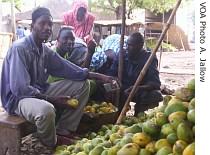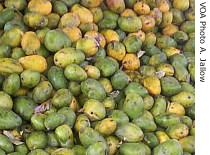2007年VOA标准英语-In Senegal, Rotting Mangoes Signal Wasted Econo(在线收听)
Dakar
05 July 2007
As the height of mango season approaches, tons of the succulent fruit arrive in the Sandika mango depot, in eastern Senegal, from villages across Guinea, Guinea-Bissau, and southern Senegal. Mangoes are plentiful in the region, but as Naomi Schwarz and Alpha Jallow report, observers say the full economic potential of the fruit is not being realized.
 |
| Abdoulie Gueye (left) sells mangoes wholesale |
Abdoulie Gueye says he sells magoes wholesale and retail. He says the market is very dirty, and during the rainy season it fills with mud and flies.
Mango season lasts roughly from May to August, the wet season in this part of West Africa.
Although mangoes are not native to the region - the first mango trees were introduced in the early 1800s from India - today they grow in abundance.
And they have become a cash crop. Many mangoes are exported to Europe. Vendors also buy mangoes and sell them in local markets and cities.
Khadia Coumba Diallo is one such vendor.
She says she comes to the Sandika depot to buy mangoes to sell elsewhere. But she says if conditions do not improve at the depot, people will not want to buy from there any more.
The Sandika depot highlights a key problem in the mango business. Across the region, including in Mali, Guinea, Senegal, and Guinea-Bissau, so many mangoes are produced in these few months that they cannot be exported or sold immediately.
They then collect in depots like Sandika, which are nothing more than central locations with makeshift stalls and some plastic tarps covering the dirt ground. They do not have facilities, such as refrigerated cases, to store the mangoes.
 |
| Many mangoes rot before being sold |
Many observers say the wasted mangoes represent a wasted opportunity for economic growth.
Isatou Diallo, who works as a civil servant in Tambacounda, says while mangoes are rotting in Senegal, growers in other countries are producing them and exporting them to Senegal and other places.
But for most Senegalese, the imported mango juice is too expensive to drink.
There are small-scale operations in the region to produce dried mango and mango jam, but they tend to be sold only locally and do not make a significant dent in the overabundance of mangoes.
Diallo says she would like to see factories in Tambacounda to turn mangoes into juice and other products.
Building such factories, she adds, would bring development to Tambacounda, which currently has no factories.